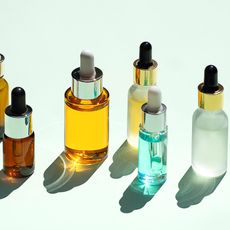FYI: A "Genetic Sweet Tooth" Could Make You Crave Sugar—Without Gaining Body Fat

Over the past couple years, sugar has increasingly become the bane of the wellness world's existence—a figurative four-letter word, undesirable number one… essentially, pure evil. The diet world loves a dynamic villain, and after the fat and carb apocalypse, there was an opening. And thus, we welcomed sugar as a worthy target—pitchforks and torches in hand.
So what are the charges? Well, pretty much everything, with sugar consumption being blamed for things like brain fog, inflammation, weight gain, and even sugar addiction. And for the most part, science and some of the industry's most knowledgeable nutritionists passionately back up the allegations. That being said, just as someone may react differently to gluten or dairy, or may require different quotas per day of fats and protein, physiologically speaking, some will react differently to sugar. The writing on the wall: If you have a particular genetic predisposition (or, as it's been so cheekily coined, "the sweet tooth gene"), you're more likely to crave sugar and, interestingly, you'll likely have less body fat—disproving the universal thought that an increase in sugar consumption tidily equates to an increase in body fat.
According to ScienceDaily, researchers discovered just last year that a certain kind of craving for sweets may be an indication for a specific genetic variation. And now, the same researchers have realized that the people with said genetic variation are also likely to have less body fat.
"People with a gene variation of FGF21 have a predisposition to less body fat than others, new research conducted at the University of Copenhagen, among others, shows," reports the source. And according to one of the researchers behind the study, associate professor Niels Grarup from the Novo Nordisk Foundation Center for Basic Metabolic Research, this truly does go against common intuition—or at least the kind of common intuition society has ingrained in us.
"It sort of contradicts common intuition that people who eat more sugar should have less body fat. But it is important to remember that we are only studying this specific genetic variation and trying to find connections to the rest of the body. This is just a small piece of the puzzle describing the connection between diet and sugar intake and the risk of obesity and diabetes," says Grarup. (So no, just because your DNA might not convert sugar as easily to body fat if you have the gene, you shouldn't necessarily convert to a cake- and ice cream–based diet—sorry.)
And yes, while less body fat is widely viewed as an indicator of better health, it doesn't paint the whole story, and the research reports people with the genetic variation are also more likely to have increased blood pressure and more fat around their waist versus other areas of the body (commonly referenced as the "apple" shape).
"Now that so many people are involved in the study, it gives our conclusions a certain robustness. Even though the difference in the amount of body fat or blood pressure level is only minor depending on whether the person has this genetic variation or not, we are very confident that the results are accurate. Around 20 percent of the European population has this genetic predisposition," says Niels Grarup.
So what's the main takeaway? Obviously, the findings serve as good food for thought, but we also think it's a helpful reminder to avoid getting swept up in every fad or trend that sweeps the diet industry. No, these researchers are by no means advocating upping your sugar intake, but a healthy life is a balanced life, and if studies like this can also remind us of our individuality when it comes to metabolism and diet and perhaps even help us—in some way—to feel more at ease with having a slice of cake with dinner or treating ourselves to ice cream or that sugary cocktail every so often, we have an appreciation for that. In fact, just the act, psychological stress, and thought process behind demonizing any kind of food group—sugar included—might actually do your body more harm than good. (And if you're looking for more information on the topic of sugar, this blog post from Robyn Nohling, FNP, RD, MSN, is incredibly enlightening.)
Disclaimer
This article is provided for informational purposes only and is not intended to be used in the place of advice of your physician or other medical professionals. You should always consult with your doctor or healthcare provider first with any health-related questions.
Erin has been writing a mix of beauty and wellness content for Who What Wear for over four years. Prior to that, she spent two and half years writing for Byrdie. She now calls Santa Monica home but grew up in Minnetonka, Minnesota, and studied writing, rhetoric, and communication at University of Wisconsin, La Crosse. She studied abroad in Galway, Ireland, and spent a summer in L.A. interning with the Byrdie and Who What Wear family. After graduating from UW, she spent one year in San Francisco, where she worked as a writer for Pottery Barn Kids and PBteen before moving down to L.A. to begin her career as a beauty editor. She considers her day-to-day beauty aesthetic very low-maintenance and relies on staples like clear brow serum (from Kimiko!), Lawless's Lip Plumping Mask in Cherry Vanilla, and an eyelash curler. For special occasions or days when she's taking more meetings or has an event, she'll wear anything and everything from Charlotte Tilbury (the foundations are game-changing), some shimmer on her lids (Stila and Róen do it best), and a few coats of the best mascara-type product on earth, Surratt's Noir Lash Tint.
-
 I Live for Yoga and Pilates—These Are the Pieces That Help My Flow
I Live for Yoga and Pilates—These Are the Pieces That Help My FlowTake notes.
By Humaa Hussain
-
 It's Time to Get Our Nutrition in Check for Summer—This App Is Making It Easy
It's Time to Get Our Nutrition in Check for Summer—This App Is Making It EasyThe recipe ideas are endless.
By Who What Wear
-
 If You're Battling With Digestive Issues, This Could Be Why
If You're Battling With Digestive Issues, This Could Be WhyTurns out, you may not have IBS after all.
By Kia Topps
-
 Our Editors Own a Lot of Sneakers, But This Pair Comes in First Place Every Time
Our Editors Own a Lot of Sneakers, But This Pair Comes in First Place Every TimeA major win.
By Aniyah Morinia
-
 I Changed My Mind About Strength Training When I Tried This Workout
I Changed My Mind About Strength Training When I Tried This WorkoutMy confidence is officially on 10.
By Kia Topps
-
 I Only Ate Sakara Life Meals for 30 Days—Here Are 7 Things That Happened
I Only Ate Sakara Life Meals for 30 Days—Here Are 7 Things That HappenedThe brand's 30-Day Fall Reset is finally here.
By Erin Jahns
-
 This Type of Gear Will Take Your Workout to the Next Level
This Type of Gear Will Take Your Workout to the Next LevelBring it on.
By Sarah Yang
-
 6 Essential Oils That Will Heal Your Painful Sunburns
6 Essential Oils That Will Heal Your Painful SunburnsAll-natural relief ahead.
By Samantha Parsons

